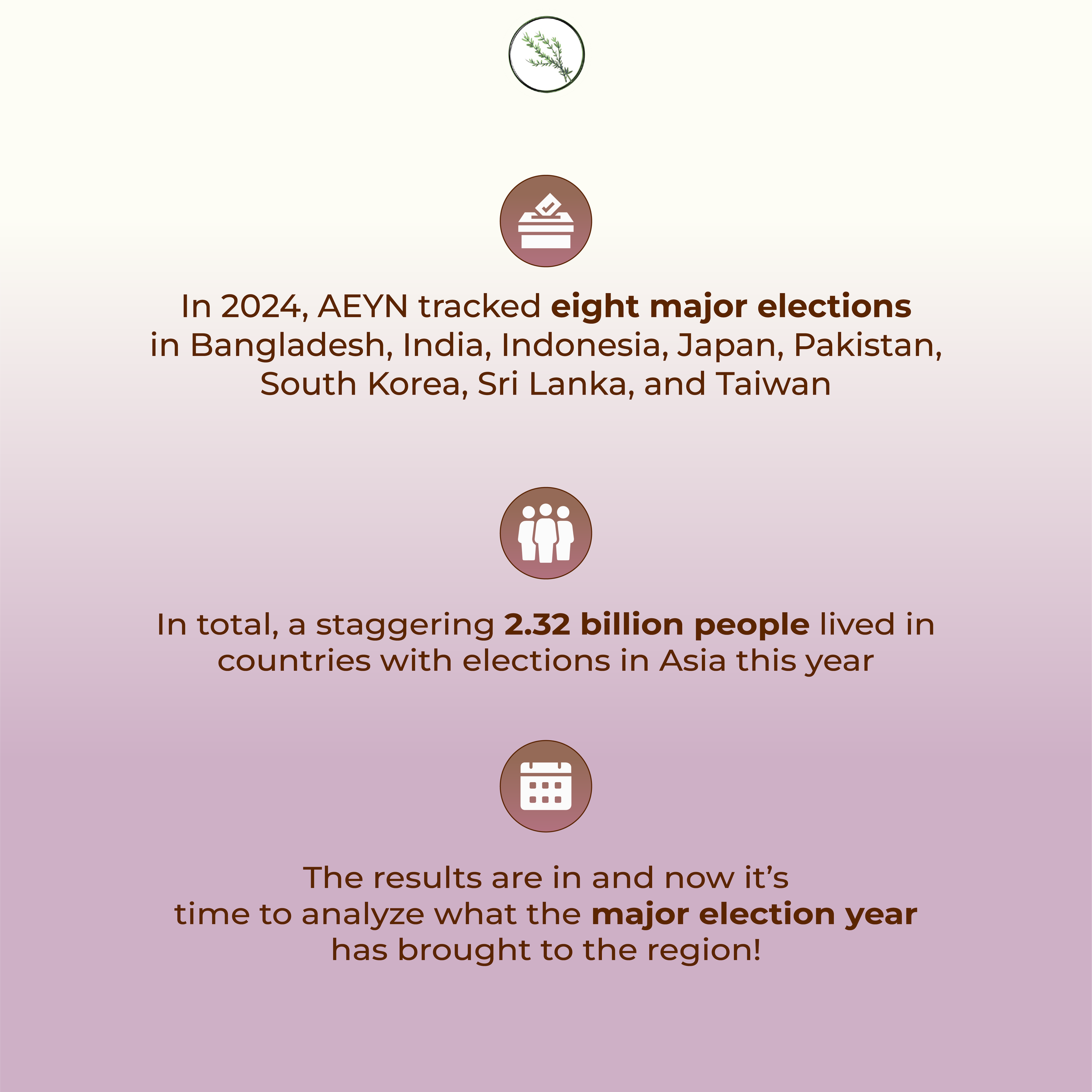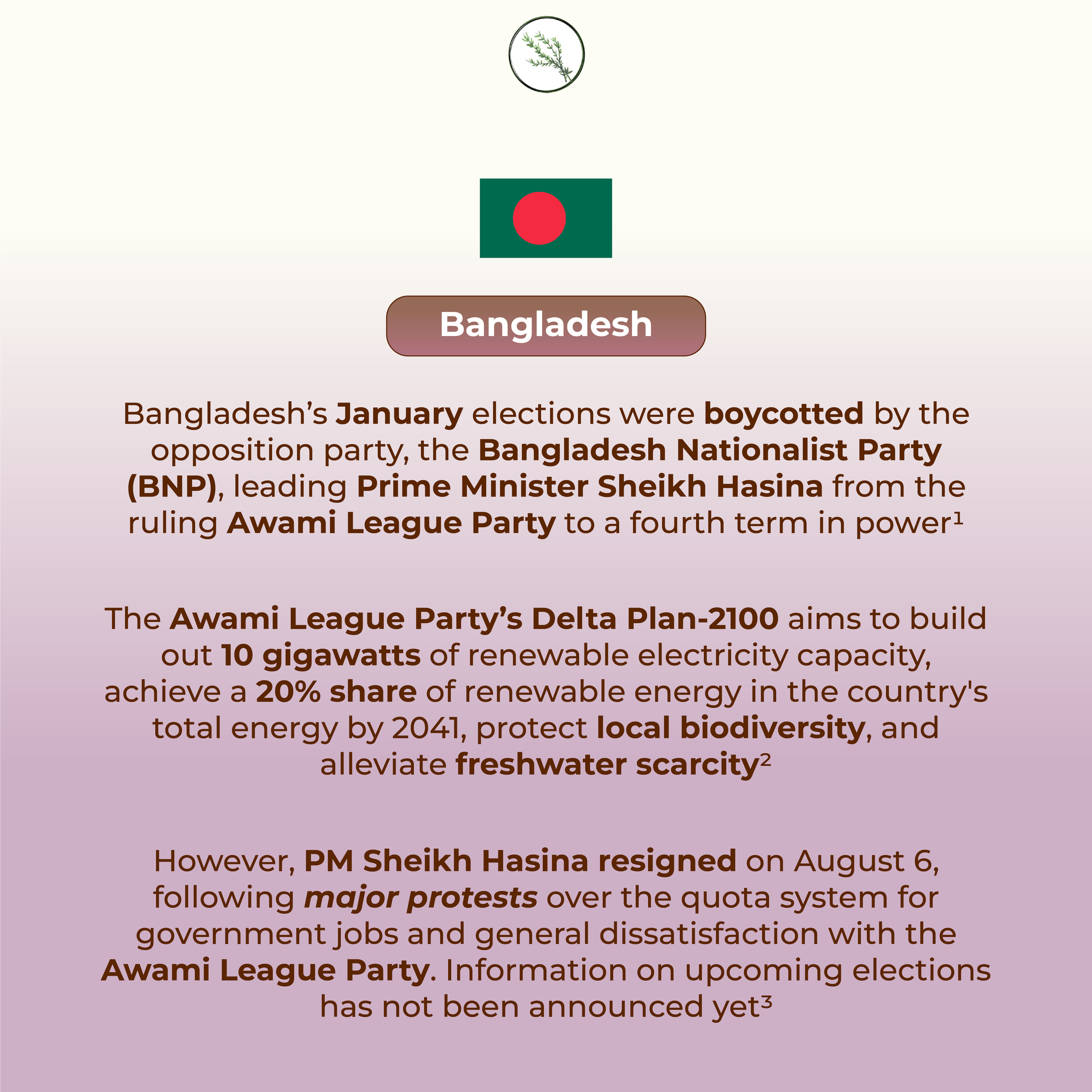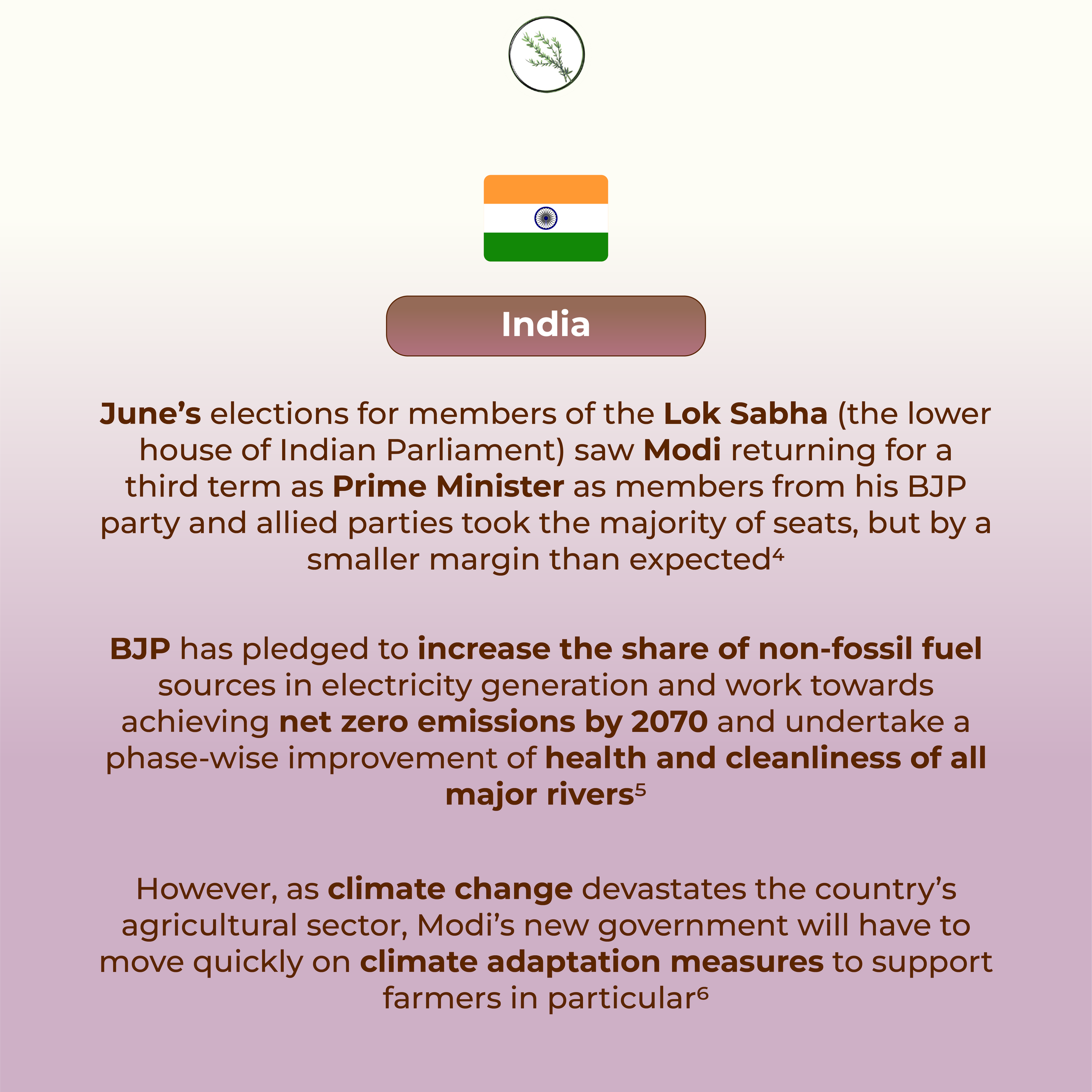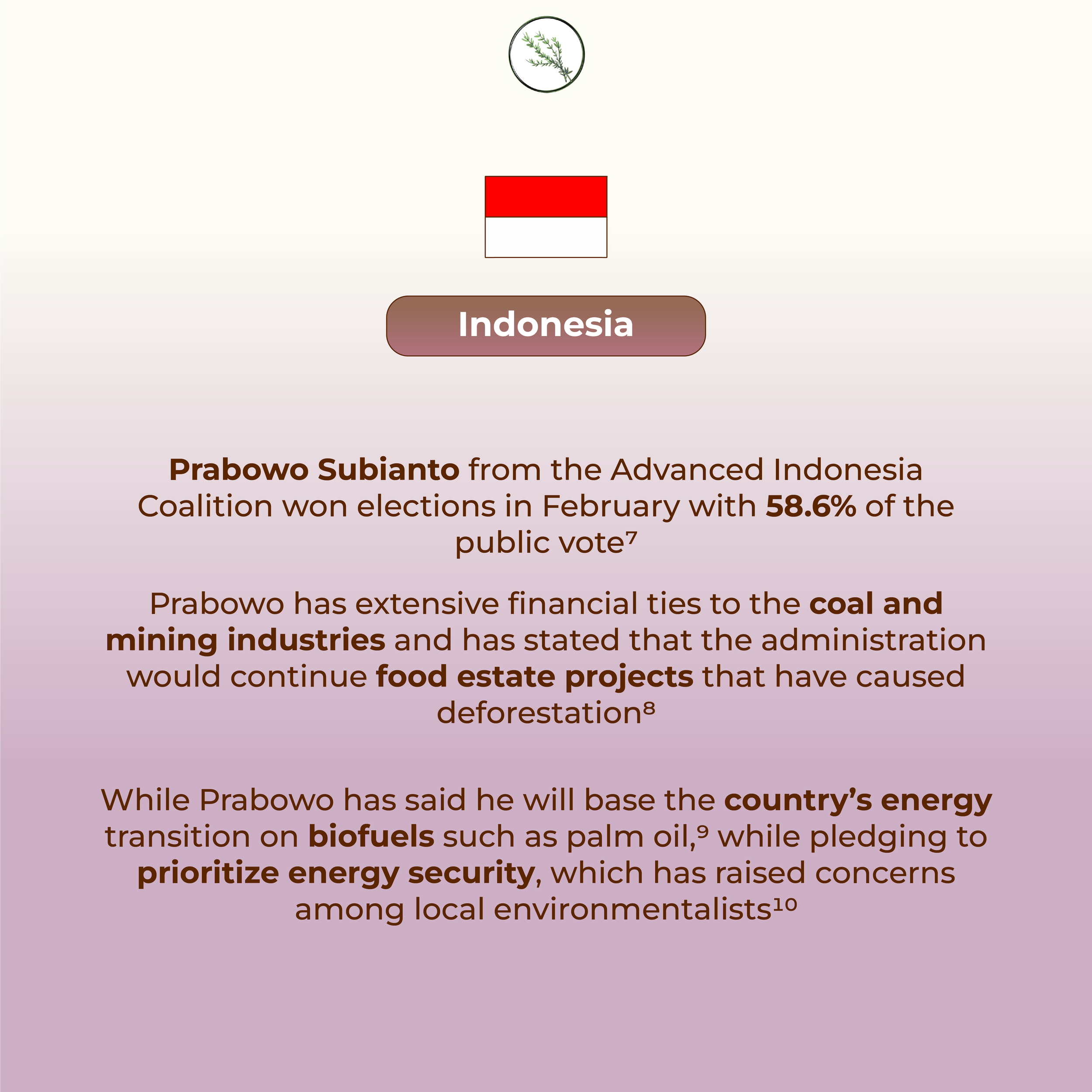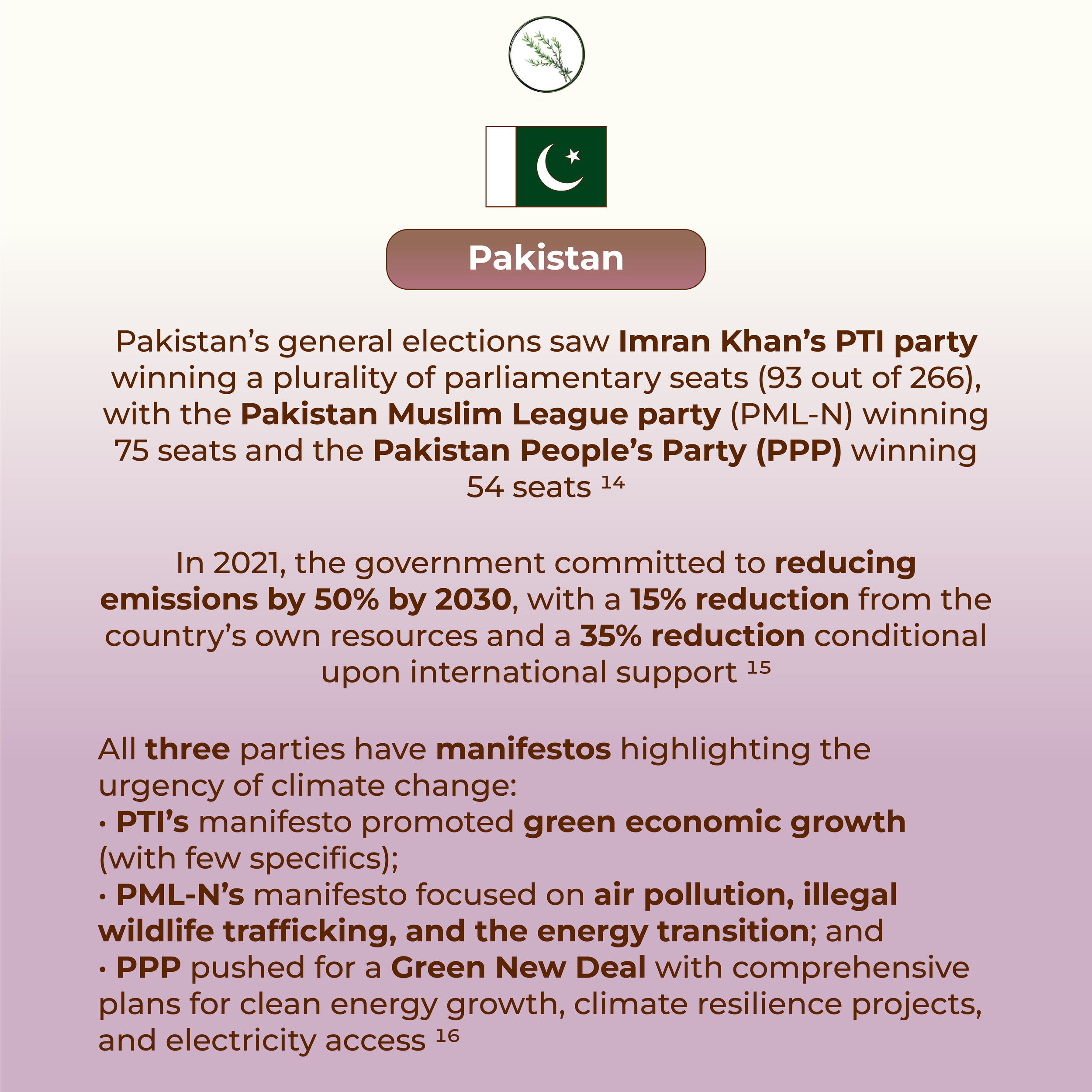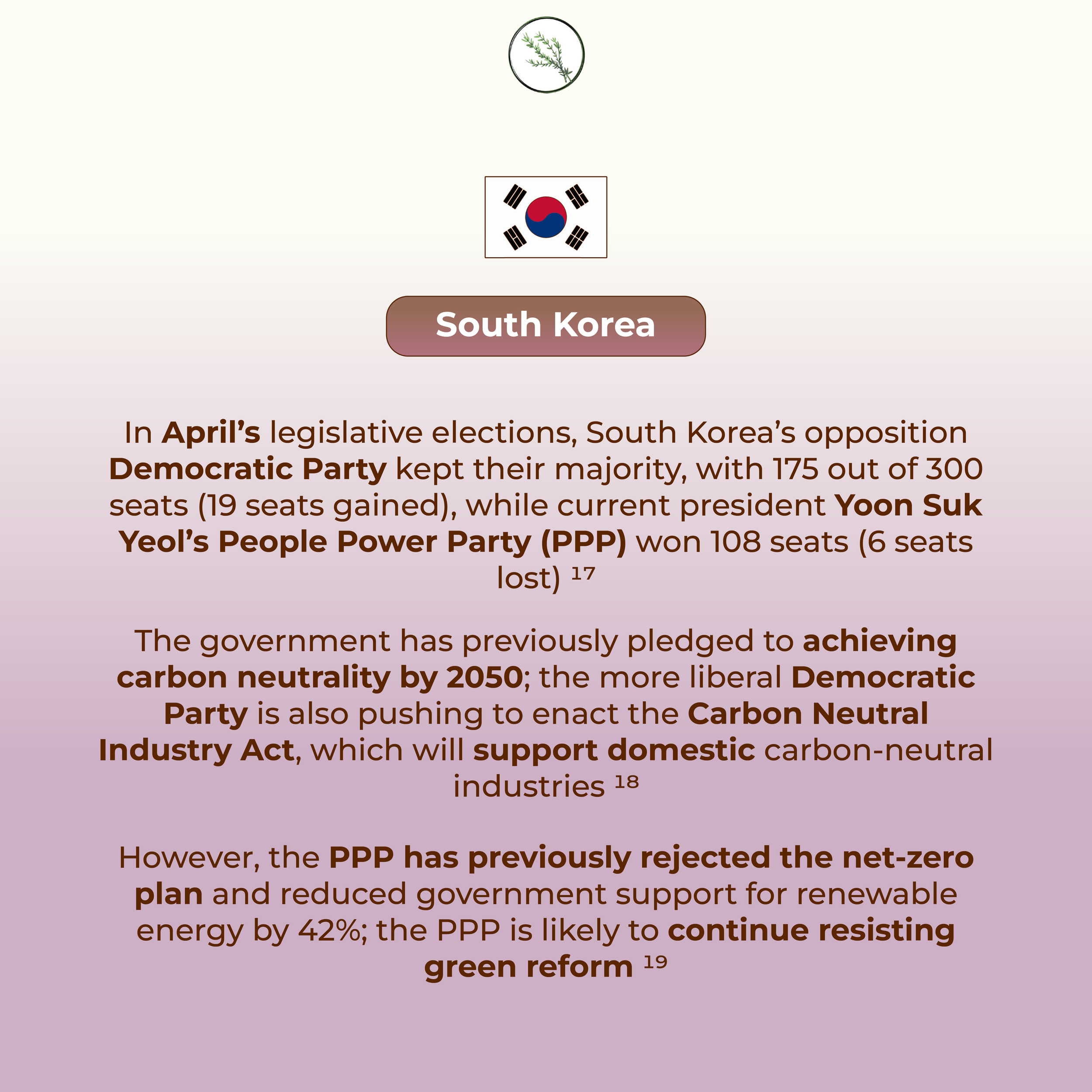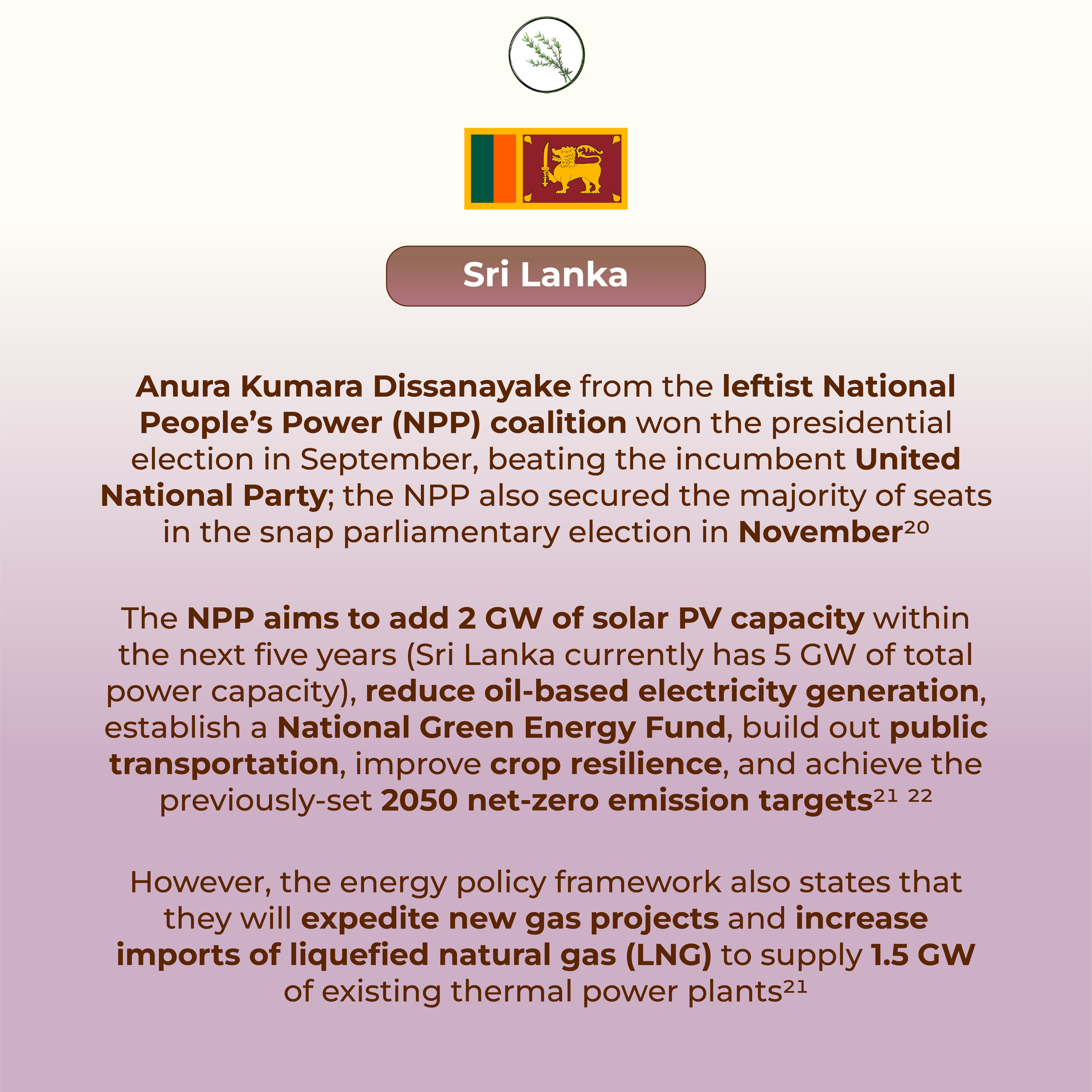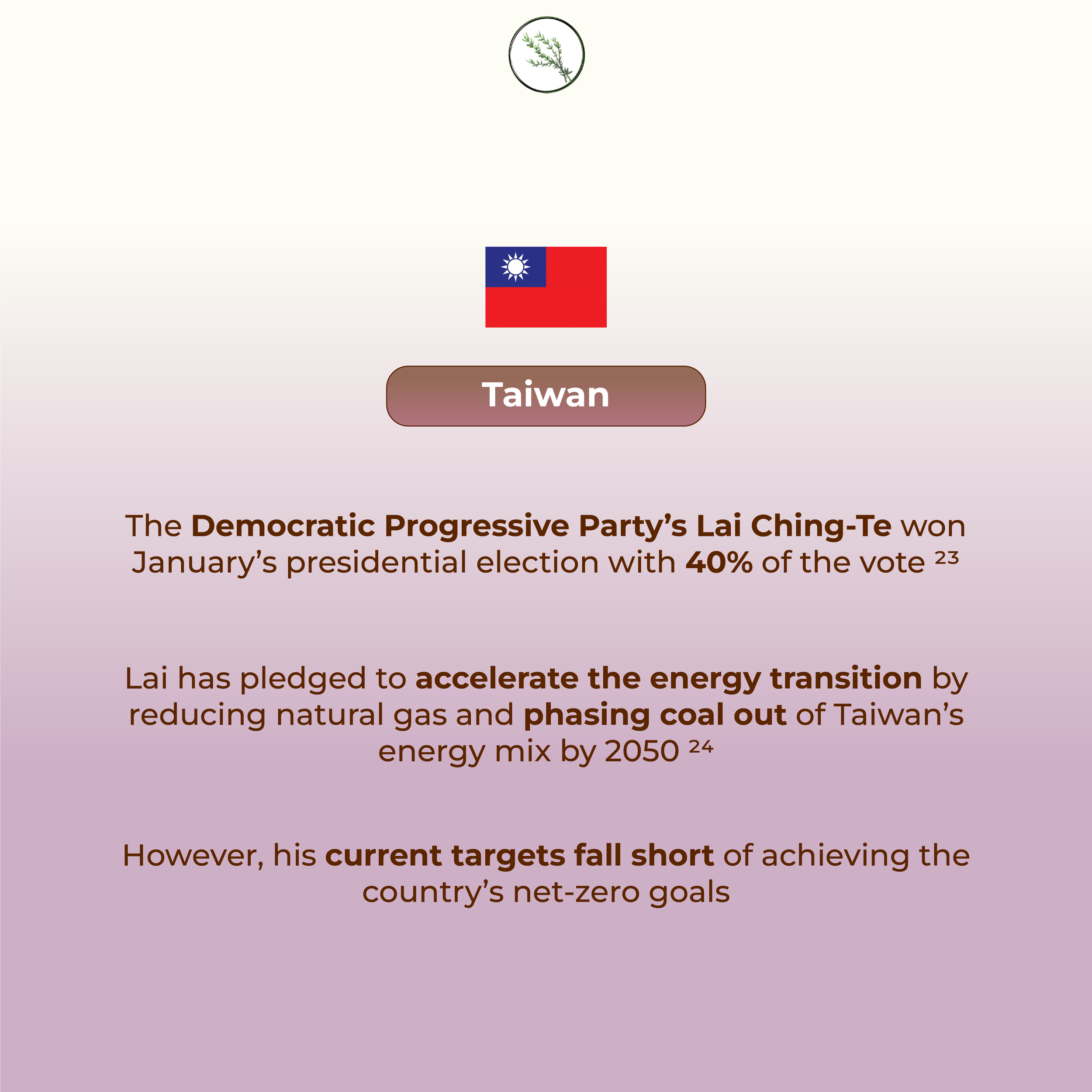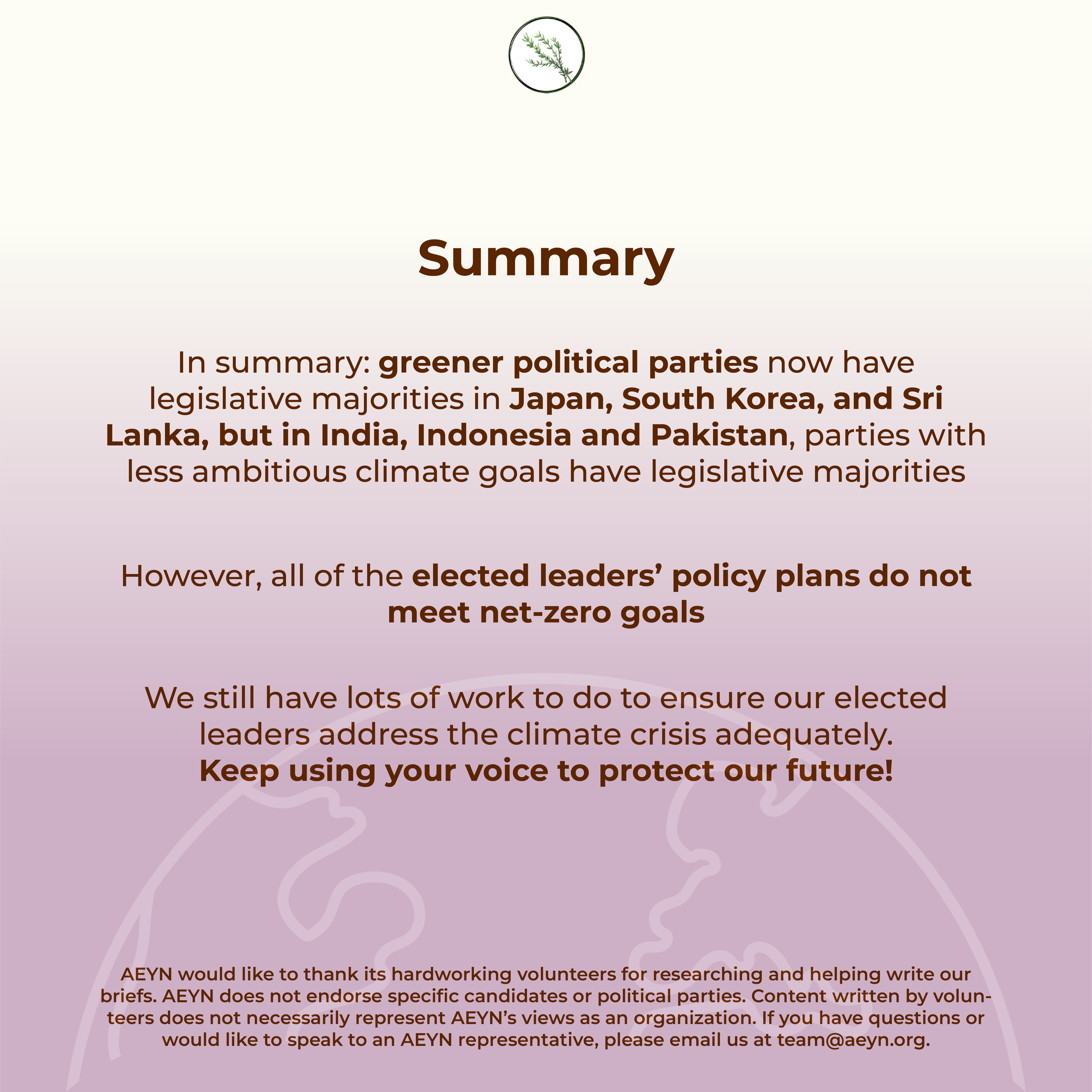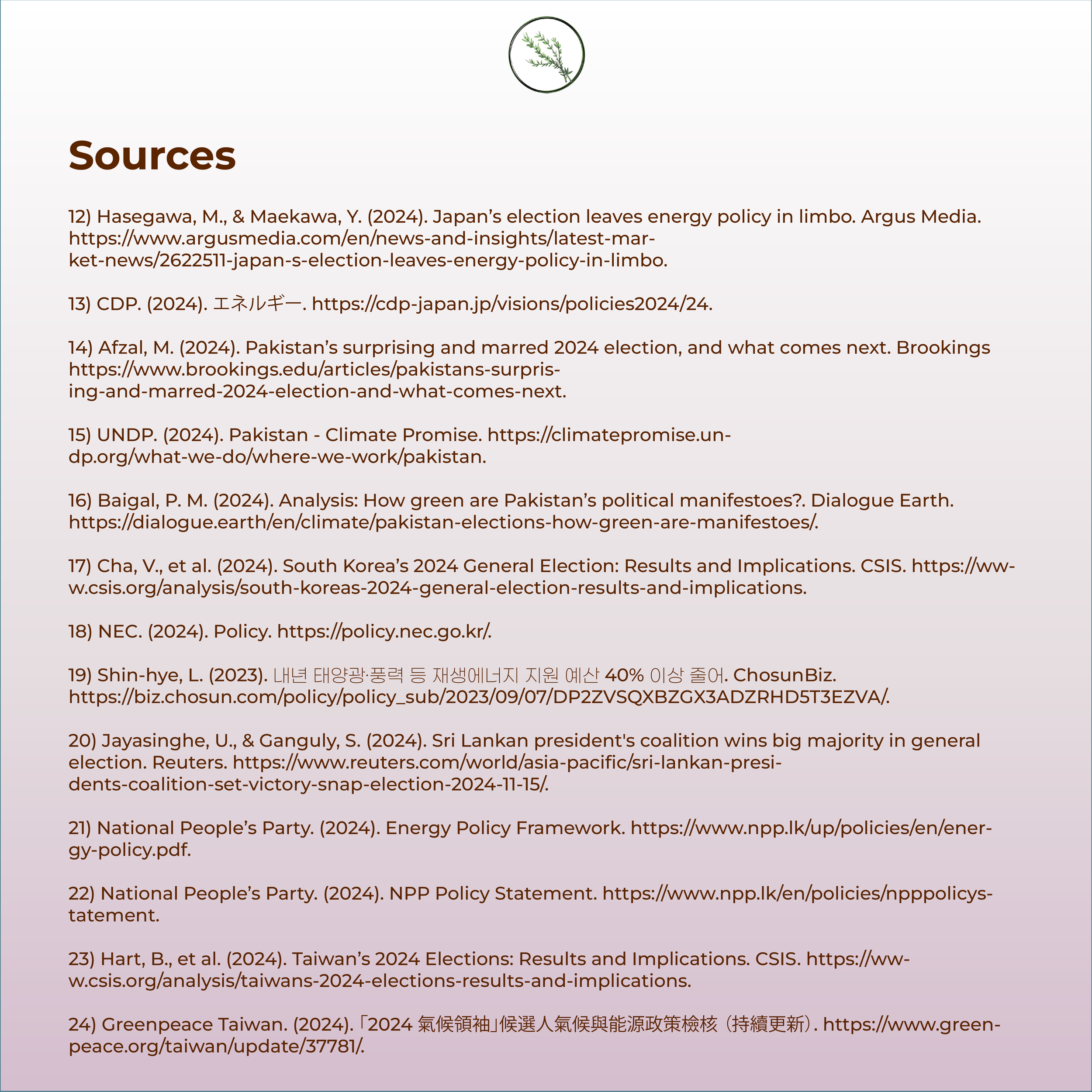Politics for the Planet
2024 Recap
Covering elections in Bangladesh 🇧🇩, India 🇮🇳, Indonesia 🇮🇩, Japan 🇯🇵, Pakistan 🇵🇰, South Korea 🇰🇷, Sri Lanka 🇱🇰, and Taiwan 🇹🇼
So what happened in 2024’s Asian elections?
In 2024, AEYN tracked eight major elections in Bangladesh, India, Indonesia, Japan, Pakistan, South Korea, Sri Lanka, and Taiwan. In total, a staggering 2.32 billion people lived in countries with elections in Asia this year. The results are in — what did this major election year bring to the region?
Bangladesh 🇧🇩
Bangladesh’s January elections were boycotted by the opposition party, the Bangladesh Nationalist Party (BNP), leading Prime Minister Sheikh Hasina from the ruling Awami League Party to a fourth term in power (1).
The Awami League Party’s Delta Plan-2100 aims to build out 10 gigawatts of renewable electricity capacity, achieve a 20% share of renewable energy in the country's total energy by 2041, protect local biodiversity, and alleviate freshwater scarcity (2).
However, PM Sheikh Hasina resigned on August 6, following major protests over the quota system for government jobs and general dissatisfaction with the Awami League Party. Information on upcoming elections has not been announced yet (3).
June’s elections for members of the Lok Sabha (the lower house of Indian Parliament) saw Modi returning for a third term as Prime Minister as members from his BJP party and allied parties took the majority of seats, but by a smaller margin than expected (4).
BJP has pledged to increase the share of non-fossil fuel sources in electricity generation and work towards achieving net zero emissions by 2070 and undertake a phase-wise improvement of health and cleanliness of all major rivers (5).
However, as climate change devastates the country’s agricultural sector, Modi’s new government will have to move quickly on climate adaptation measures to support farmers in particular (6).
Prabowo Subianto from the Advanced Indonesia Coalition won elections in February with 58.6% of the public vote (7).
Prabowo has extensive financial ties to the coal and mining industries and has stated that the administration would continue food estate projects that have caused deforestation (8).
While Prabowo has said he will base the country’s energy transition on biofuels such as palm oil (9), while pledging to prioritize energy security, which has raised concerns among local environmentalists (10).
Japan 🇯🇵
The ruling Liberal Democratic Party (LDP) called a snap election in October, which left the LDP without a majority in parliament for the first time since 2009 (215 seats out of 465 in total), while the oppositional Constitutional Democratic Party (CDP) gained many more seats (148) (11).
The LDP advocates for pro-nuclear energy policies, but the CDP pledged to phase-out existing reactors and prevent expanding current capacity (12). However, the CDP’s climate plan is slightly more ambitious than the LDP’s – Japan’s strategic energy plan (put in place by a LDP-led government) targeted a 46% reduction in emissions by 2031 with renewables (excluding nuclear) making up 36-38% of the electricity demand; meanwhile, the CDP targets a 55%+ reduction in emissions by 2030 with renewables (excluding nuclear) making up 50% of electricity generation (12, 13).
Pakistan 🇵🇰
Pakistan’s general elections saw Imran Khan’s PTI party winning a plurality of parliamentary seats (93 out of 266), with the Pakistan Muslim League party (PML-N) winning 75 seats and the Pakistan People’s Party (PPP) winning 54 seats (14).
In 2021, the government committed to reducing emissions by 50% by 2030, with a 15% reduction from the country’s own resources and a 35% reduction conditional upon international support (15).
All three parties have manifestos highlighting the urgency of climate change:
PTI’s manifesto promoted green economic growth (with few specifics);
PML-N’s manifesto focused on air pollution, illegal wildlife trafficking, and the energy transition; and
PPP pushed for a Green New Deal with comprehensive plans for clean energy growth, climate resilience projects, and electricity access (16).
In April’s legislative elections, South Korea’s opposition Democratic Party kept their majority, with 175 out of 300 seats (19 seats gained), while current president Yoon Suk Yeol’s People Power Party (PPP) won 108 seats (6 seats lost) (17).
The government has previously pledged to achieving carbon neutrality by 2050; the more liberal Democratic Party is also pushing to enact the Carbon Neutral Industry Act, which will support domestic carbon-neutral industries (18).
However, the PPP has previously rejected the net-zero plan and reduced government support for renewable energy by 42%; the PPP is likely to continue resisting green reform (19).
Sri Lanka 🇱🇰
Anura Kumara Dissanayake from the leftist National People’s Power (NPP) coalition won the presidential election in September, beating the incumbent United National Party; the NPP also secured the majority of seats in the snap parliamentary election in November (20).
The NPP aims to add 2 GW of solar PV capacity within the next five years (Sri Lanka currently has 5 GW of total power capacity), reduce oil-based electricity generation, establish a National Green Energy Fund, build out public transportation, improve crop resilience, and achieve the previously-set 2050 net-zero emission targets (21, 22).
However, the energy policy framework also states that they will expedite new gas projects and increase imports of liquefied natural gas (LNG) to supply 1.5 GW of existing thermal power plants (21).
The Democratic Progressive Party’s Lai Ching-Te won January’s presidential election with 40% of the vote (23).
Lai has pledged to accelerate the energy transition by reducing natural gas and phasing coal out of Taiwan’s energy mix by 2050 (24).
However, his current targets fall short of achieving the country’s net-zero goals.
Summary
Greener political parties now have legislative majorities in Japan, South Korea, and Sri Lanka, but in India, Indonesia and Pakistan, parties with less ambitious climate goals have legislative majorities.
However, all of the elected leaders’ policy plans do not meet net-zero climate targets.
We still have lots of work to do to ensure our elected leaders address the climate crisis adequately. Keep using your voice to protect our future!
Credits
Written by: AEYN Volunteer Team
Designed by: Frencis Mae
Sources
Singh, K. (2024). US says Bangladesh elections were not free and fair. Reuters. https://www.reuters.com/world/asia-pacific/us-says-bangladesh-elections-were-not-free-fair-2024-01-08/.
Shawon, A. A. (2023). Awami League promises to protect environment in election manifesto. Dhaka Tribune. https://www.dhakatribune.com/bangladesh/335077/awami-league-promises-to-protect-environment-in.
Associated Press. (2024). Bangladeshi PM Sheikh Hasina resigns, flees country as protesters storm her official residence. Politico. https://www.politico.com/news/2024/08/05/bangladesh-prime-minister-resigns-flees-country-00172623.
Pathi, K., et al. (2024). Modi claims victory in India’s election but drop in support forces him to rely on coalition partners. AP News. https://apnews.com/article/india-election-results-2024-lok-sabha-modi-bjp-7893efecc83fa8225a611f174e6420ee#.
BJP Party. (2024). BJP Manifesto 2024. https://www.bjp.org/bjp-manifesto-2024.
Sengupta, S. (2024). Modi Will Feel the Heat in a Third Term. And Not Just Politically. New York Times. https://www.nytimes.com/2024/06/04/climate/modi-climate-india-election.html.
Le Monde. (2024). Indonesia: Prabowo Subianto wins presidency, official results confirm. https://www.lemonde.fr/en/international/article/2024/03/20/indonesia-prabowo-subianto-wins-presidency-official-results-confirm_6639261_4.html.
Cahyadi, F. (2024). Bad signs of climate crisis policy from Indonesia’s Prabowo-Gibran presidential pair. Eco-Business. https://www.eco-business.com/opinion/bad-signs-of-climate-crisis-policy-from-indonesias-prabowo-gibran-presidential-pair/.
Pranowo, G. & Mahfud, M. (2023). VISI DAN MISI. MMC. https://mmc.tirto.id/documents/2023/10/20/1242-visi-misi-ganjar-pranowo-mahfud-md.pdf?x=2676.
Dianti, T. (2024). Prabowo’s pledge to prioritize energy security stirs environmentalist concerns in Indonesia. Benar News. https://www.benarnews.org/english/news/indonesian/environmental-priorities-06172024130712.html.
Murakami, S., et al. (2024). Japan's ruling coalition loses majority, election outcome in balance. Reuters. https://www.reuters.com/world/asia-pacific/japan-votes-election-expected-punish-pm-ishibas-coalition-2024-10-26/.
Hasegawa, M., & Maekawa, Y. (2024). Japan’s election leaves energy policy in limbo. Argus Media. https://www.argusmedia.com/en/news-and-insights/latest-market-news/2622511-japan-s-election-leaves-energy-policy-in-limbo.
CDP. (2024). エネルギー. https://cdp-japan.jp/visions/policies2024/24.
Afzal, M. (2024). Pakistan’s surprising and marred 2024 election, and what comes next. Brookings https://www.brookings.edu/articles/pakistans-surprising-and-marred-2024-election-and-what-comes-next.
UNDP. (2024). Pakistan - Climate Promise. https://climatepromise.undp.org/what-we-do/where-we-work/pakistan.
Baigal, P. M. (2024). Analysis: How green are Pakistan’s political manifestoes?. Dialogue Earth. https://dialogue.earth/en/climate/pakistan-elections-how-green-are-manifestoes/.
Cha, V., et al. (2024). South Korea’s 2024 General Election: Results and Implications. CSIS. https://www.csis.org/analysis/south-koreas-2024-general-election-results-and-implications.
NEC. (2024). Policy. https://policy.nec.go.kr/.
Shin-hye, L. (2023). 내년 태양광·풍력 등 재생에너지 지원 예산 40% 이상 줄어. ChosunBiz. https://biz.chosun.com/policy/policy_sub/2023/09/07/DP2ZVSQXBZGX3ADZRHD5T3EZVA/.
Jayasinghe, U., & Ganguly, S. (2024). Sri Lankan president's coalition wins big majority in general election. Reuters. https://www.reuters.com/world/asia-pacific/sri-lankan-presidents-coalition-set-victory-snap-election-2024-11-15/.
National People’s Party. (2024). Energy Policy Framework. https://www.npp.lk/up/policies/en/energy-policy.pdf.
National People’s Party. (2024). NPP Policy Statement. https://www.npp.lk/en/policies/npppolicystatement.
Hart, B., et al. (2024). Taiwan’s 2024 Elections: Results and Implications. CSIS. https://www.csis.org/analysis/taiwans-2024-elections-results-and-implications.
Greenpeace Taiwan. (2024). 「2024 氣候領袖」候選人氣候與能源政策檢核 (持續更新). https://www.greenpeace.org/taiwan/update/37781/.
Other Resources
Interested in learning more about Asia’s elections?
Disclaimer: AEYN would like to thank its hardworking volunteers for researching and helping write our briefs. AEYN does not endorse specific candidates or political parties. Content written by volunteers does not necessarily represent AEYN’s views as an organization. If you have questions or would like to speak to an AEYN representative, please email us at team@aeyn.org.


